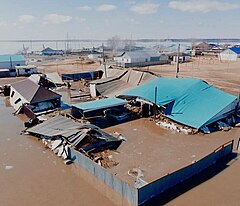
The Ural, also known as the Yaik, is a river flowing through Russia and Kazakhstan in the continental border between Europe and Asia. It originates in the southern Ural Mountains and discharges into the Caspian Sea. At 2,428 kilometres (1,509 mi), it is the third-longest river in Europe after the Volga and the Danube, and the 18th-longest river in Asia. The Ural is conventionally considered part of the boundary between the continents of Europe and Asia.

Tobolsk is a town in Tyumen Oblast, Russia, located at the confluence of the Tobol and Irtysh rivers. Founded in 1590, Tobolsk is the second-oldest Russian settlement east of the Ural Mountains in Asian Russia, and was the historic capital of the Siberia region. Population: 100,352 (2021 Census); 99,694 (2010 Census); 92,880 (2002 Census); 94,143 (1989 Soviet census).

Tyumen Oblast is a federal subject of Russia. It is located in Western Siberia, and is administratively part of the Urals Federal District. The oblast has administrative jurisdiction over two autonomous okrugs: Khanty-Mansi and Yamalo-Nenets Autonomous Okrug. The oblast, including its autonomous okrugs, is the third-largest federal subject by area, and has a population of 3,395,755 (2010).
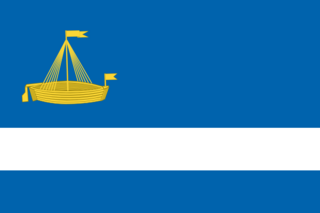
Tyumen is the administrative center and largest city of Tyumen Oblast, Russia. It is situated just east of the Ural Mountains, along the Tura River. Fueled by the Russian oil and gas industry, Tyumen has experienced rapid population growth in recent years, rising to a population of 847,488 at the 2021 Census. Tyumen is among the largest cities of the Ural region and the Ural Federal District. Tyumen is often regarded as the first Siberian city, from the western direction.

Orenburg, formerly known as Chkalov (1938–1957), is the administrative center of Orenburg Oblast, Russia. It lies in Eastern Europe, along the banks of the Ural River, being approximately 1,480 kilometers (920 mi) southeast of Moscow.

Ural Economic Region is one of twelve economic regions of Russia. This prominent industrial region consists of the following subdivisions : Bashkortostan (Ufa), Chelyabinsk Oblast (Chelyabinsk), Kurgan Oblast (Kurgan), Orenburg Oblast (Orenburg), Perm Krai (Perm), Sverdlovsk Oblast (Yekaterinburg) and Udmurt Republic (Izhevsk). It is mostly located in the Central, and partly in the Southern and Northern parts of the Urals, but also includes parts of the East European and West Siberian Plains. Its extent is different from that of the Ural Federal District; Bashkortostan, Orenburg Oblast, Perm Krai and Udmurtia are in the Volga Federal District while the other three are in the Ural Federal District.

The river Iset in Russia flows from the Urals through the Sverdlovsk and Kurgan Oblasts, then through Tyumen Oblast in Western Siberia into the river Tobol. The city of Yekaterinburg is on the upper part of the river.
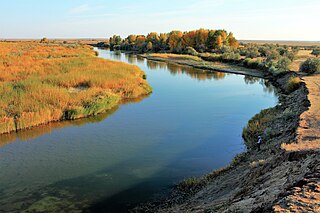
The Ilek is a river in the Aktobe Region, Kazakhstan, and Orenburg Oblast, Russia. It is 149 kilometres (93 mi) long, and has a drainage basin of 13,700 square kilometres (5,300 sq mi).

UTC+05:00 is an identifier for a time offset from UTC of +05:00. This time is used in:
Geographically, Siberia includes the Russian Urals, Siberian, and Far Eastern Federal Districts.

Western Siberia or West Siberia is a region in North Asia. It is part of the wider region of Siberia that is mostly located in the Russian Federation, with a Southern part in Kazakhstan. It lies between the Ural region and the Yenisei River, which conventionally divides Siberia into two halves.
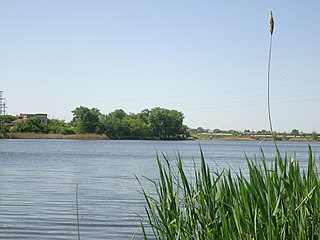
The Uy is a river in Chelyabinsk Oblast in Russia with its upper reaches in Bashkortostan. It partially flows along the borders of Chelyabinsk and Kurgan Oblasts with Kazakhstan. The Uy is a left tributary of the Tobol. The length of the river is 462 km. The area of its basin is 34,400 km2. It freezes up in November and stays icebound in April. The town of Troitsk and three reservoirs are situated on the Uy.
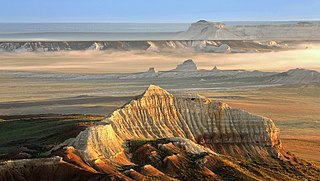
Aktobe Region is a region of Kazakhstan. The name Aktobe comes from Kazakh aq 'white' and töbe 'hill' or 'top '; supposedly, Aktobe's initial settlers were able to see white mountains far to the north. The Aktobe regional capital is the city of Aktobe. The region is located in the western part of Kazakhstan. Its area is 300,629 km2, which is 11 per cent of the territory of Kazakhstan. The population is 909 673 as of June 1, 2022.
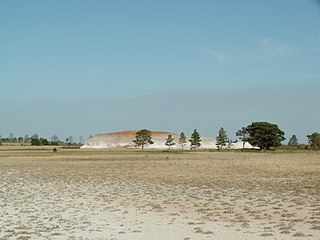
Kostanay Region is a region of Kazakhstan. Its administrative center is the city of Kostanay. The population of the region is 835,686. The population living in Kostanay is 207,000 which is equivalent to 23% of the region.
The Or is a river in Orenburg Oblast of Russia and Aktobe Province of Kazakhstan. It is a left tributary of the Ural, and is 332 km long, with a drainage basin of 18 600 km2. The river is formed by the confluence of the rivers Shiyli and Terisbutak, which have their sources on the western slopes of the Mugodzhar Hills, and it joins the Ural by the city of Orsk. Most of its discharge are from melting snow. The average discharge, 61 km from its mouth, is 21.3 m3/sek. The spring flooding lasts from April to mid-May. The rest of the year the waterlevel is very low. The river freezes in late October and is icebound until March – April. The river is used for irrigation and water supply.

Berdyuzhsky District is an administrative district (raion), one of the twenty-two in Tyumen Oblast, Russia. As a municipal division, it is incorporated as Berdyuzhsky Municipal District. It is located in the south of the oblast. The area of the district is 2,800 square kilometers (1,100 sq mi). Its administrative center is the rural locality of Berdyuzhye. Population: 11,490 ; 13,019 (2002 Census); 14,659 (1989 Soviet census). The population of Berdyuzhye accounts for 44.9% of the district's total population.

The Kazakhstan–Russia border is the 7,644-kilometre (4,750 mi) international border between the Republic of Kazakhstan and the Russian Federation. It is the longest continuous international border in the world and the second longest by total length, after the Canada–United States border. It is in the same location as the former administrative-territorial border between the Kazakh Soviet Socialist Republic and the Russian Soviet Federative Socialist Republic.

Siberian Tatar is a Turkic language spoken by about 140,000 people in Western Siberia, Russia, primarily in the oblasts of Tyumen, Novosibirsk, Omsk but also in Tomsk and Kemerovo. According to Marcel Erdal, due to its particular characteristics, Siberian Tatar can be considered as a bridge to Siberian Turkic languages.
Orenburzhie is a commercial airline headquartered in Orenburg, Russia, on the ground of Orenburg Airport. It serves as regular and charter passenger airline out of Orenburg and Izhevsk Airport.
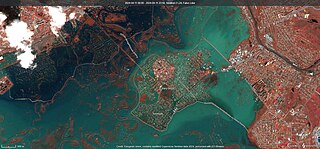
On 5 April 2024, the Orsk Dam collapsed due to flooding along the Ural River, prompting evacuations. At least six people were injured and damage was estimated to be around 1.2 billion rubles.
